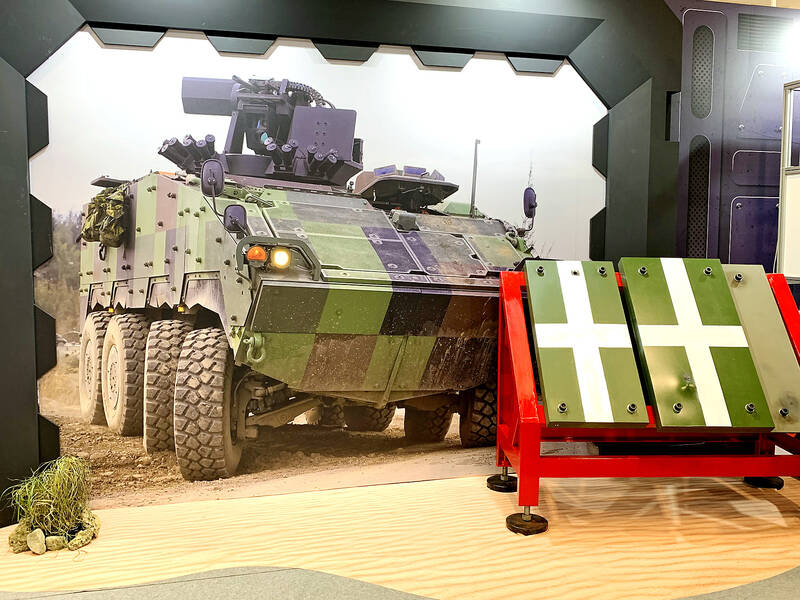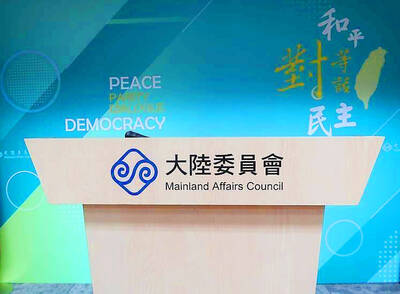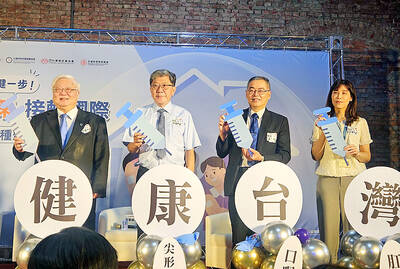The Chungshan Institute of Science and Technology has unveiled a new composite armor material and hydrogen fuel cells in a demonstration of the latest products from the Ministry of National Defense’s research and development arm.
The novel armor is to be utilized as a part of an add-on protection package for armored and soft-skinned vehicles, as well as helicopters and ships, an institute spokesperson said at the Taiwan Innotech Expo in Taipei on Thursday.
A CM-32 infantry fighting vehicle fitted with the new armor would be rated as being able to protect against large caliber weapons fire, significantly boosting the survivability of the platform and its crew, the spokesperson said.

Photo: Chen Chih-cheng, Taipei Times
A shell casing showcased at the exhibit suggested the institute’s live-fire trial used a 30mm chain gun, a more powerful weapon than the 25mm guns the frontal armor of the CM-32 was designed to withstand.
The armor design achieved a superior strength-to-weight ratio compared with its predecessors by replacing aluminum carbide with silicon carbide, the spokesperson said.
The protection packages can be customized to suit the user’s operational needs, they said.
The institute would not proceed with mass production of the armor until it receives interest from the armed forces, they said.
A display at the expo indicated that the armor used tiles arrayed in a honeycomb pattern between ballistic steel.
Ministry of National Defense records showed that the improved composite armor project, which cost NT$950 million (US$29.61 million), has passed operational trials and its adoption into service is pending.
The institute’s fuel cell uses a proprietary dehydrogenated powder-based technology for energy storage, enabling its use as a mobile power source, the spokesperson said.
The institute sources 80 percent of the parts for the project from domestic manufacturers, they added.
The system, which uses highly efficient hydrogen production and energy conversion, is low-cost, compact and easy to install, they said.
The technologies used in the cell have multiple potential military applications, including power generation in submarines, energy storage in uncrewed undersea vehicles and hydrogen rocket fuel manufacturing, they said.

A Chinese aircraft carrier group entered Japan’s economic waters over the weekend, before exiting to conduct drills involving fighter jets, the Japanese Ministry of Defense said yesterday. The Liaoning aircraft carrier, two missile destroyers and one fast combat supply ship sailed about 300km southwest of Japan’s easternmost island of Minamitori on Saturday, a ministry statement said. It was the first time a Chinese aircraft carrier had entered that part of Japan’s exclusive economic zone (EEZ), a ministry spokesman said. “We think the Chinese military is trying to improve its operational capability and ability to conduct operations in distant areas,” the spokesman said. China’s growing

BUILDUP: US General Dan Caine said Chinese military maneuvers are not routine exercises, but instead are ‘rehearsals for a forced unification’ with Taiwan China poses an increasingly aggressive threat to the US and deterring Beijing is the Pentagon’s top regional priority amid its rapid military buildup and invasion drills near Taiwan, US Secretary of Defense Pete Hegseth said on Tuesday. “Our pacing threat is communist China,” Hegseth told the US House of Representatives Appropriations Subcommittee on Defense during an oversight hearing with US General Dan Caine, chairman of the Joint Chiefs of Staff. “Beijing is preparing for war in the Indo-Pacific as part of its broader strategy to dominate that region and then the world,” Hegseth said, adding that if it succeeds, it could derail

COMPLIANCE: The SEF has helped more than 3,900 Chinese verify documents, indicating that most of those affected are willing to cooperate, the MAC said More than 3,100 spouses from China have submitted proof of renunciation of their Chinese household registration, the Mainland Affairs Council (MAC) said yesterday. The National Immigration Agency has since April issued notices to spouses to submit proof that they had renounced their Chinese household registration on or before June 30 or their Taiwanese household registration would be revoked. People having difficulties obtaining such a document can request an extension of the deadline or submit a written affidavit in lieu of it. The council said it would hold a briefing at 2:30pm on Friday at the immigration agency’s Taichung office in cooperation with the

The government-funded human papillomavirus (HPV) vaccination is to be expanded to boys at junior-high school starting in September, the Health Promotion Administration (HPA) said yesterday. The Taiwan Society of Otorhinolaryngology, Head and Neck Surgery, the Taiwan Association of Obstetrics and Gynecology, the Taiwan Immunization Vision and Strategy, the Infectious Diseases Society of Taiwan, the Taiwan Head and Neck Society, the Formosa Cancer Foundation and the National Alliance of Presidents of Parents Associations held a joint news conference in Taipei yesterday to raise public awareness about the risks of HPV infection, regardless of gender. Invited to give an address, HPA Director-General Wu Chao-chun